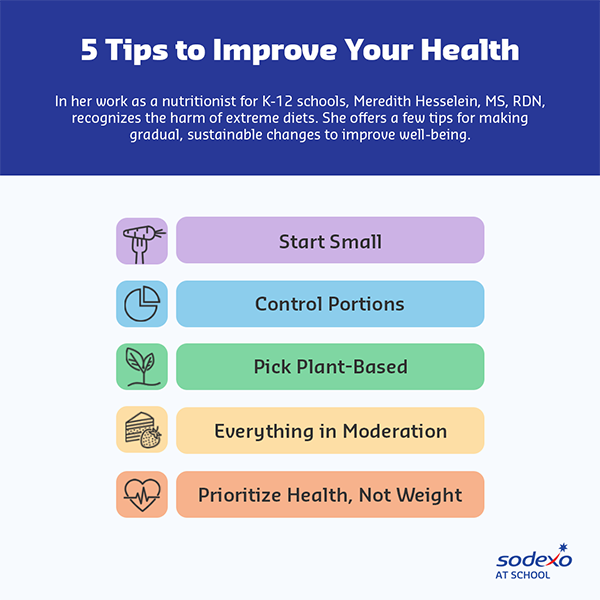By Meredith Hesselein, MS, RDN
Learning how and what to eat is an ongoing process for children, but they can be notoriously picky eaters. They’re reluctant to try unfamiliar foods, and they’re often quick to reject certain flavors or textures. As a registered dietitian for Sodexo Schools, one of my primary goals is to help kids develop a healthy relationship with food.
Sodexo helps students learn to make good choices at school with menus full of nutritious options kids actually want to eat (never underestimate the power of adding a little cheese to broccoli or cutting fruit into fun shapes). We focus on dishes that are low-sodium, rich in whole grains and free of trans fats, and we encourage kids to eat more fruits and vegetables at school.
However, children learn about eating and nutrition from myriad sources each day, not just when they’re in the school cafeteria. As a mom of two young children, I understand the immense influence my behaviors have on my own kids. For children to develop a healthy relationship with food, it’s crucial for the adults in their lives to model good habits. Unfortunately, disordered eating is on the rise among kids, with one study finding more than 20% of children and adolescents exhibited signs of disordered eating.
Diet culture has long been revealed to be toxic for both children and adults. Extremely restrictive diets rarely produce sustainable long-term results, and some diets can be dangerous and harmful. Dehydration, lack of energy, unstable blood sugar levels, nutrient deficiencies, and other negative effects are common with extreme diets.
Even as we come to recognize the harm of these diets, their allure can be hard to resist. We’ve all seen the old familiar messages when January rolls around. Each year, we’re bombarded with ideas about how a new year is an opportunity to build a “new you.” If only we try hard enough, find the right plan, or uncover some magic secret, we can achieve all of our goals and live our best lives. With such a constant stream of wellness and self-optimization content coming at us from all directions, it’s easy to fall into the trap of setting too many lofty goals that are impossible to stick to over the long term.
So what’s the alternative? We have to change the narrative around food, diets and the ever-elusive quest for wellness. Rather than trying to completely overhaul your habits overnight, the key is to focus on realistic, achievable steps to gradually improve your health.
Here are a few tips to help you begin.
Start Small
Making extreme changes is unrealistic and typically leads to frustration and failure. Instead, look for small changes you can incorporate gradually. Can you swap fries for a side salad at lunch? How about switching sugary processed foods for fresh fruit? Or snacking on chopped vegetables with hummus instead of chips? These small changes add up over time.
Control Portions
Get in the habit of checking labels and managing portion sizes. We often greatly underestimate the amount we’re eating, and learning how to portion food is crucial. To start, try putting one serving of something on your plate. Once you’re done, wait a bit before going back for seconds to see if you’re really still hungry.
Reach for Plant-Based Foods
Incorporating more fruits, vegetables and other fiber-rich plant-based foods into your diet is a great way to fill up on vital nutrients instead of empty calories. Plus, switching to plant-based ingredients can help you improve your overall health by reducing saturated fats in your diet.
Enjoy Everything in Moderation
The moment we decide something is completely off limits, our cravings go into overdrive. And avoiding certain types of food, such as carbs, can wreak havoc on your body. Aim to eat a balanced diet that includes a wide range of foods, and let yourself indulge in a moderate amount of the decadent foods you love from time to time.
Prioritize Health, Not the Scale
Weight is not the only measure of good health. Improving your diet, choosing more nutrient-dense foods, getting more physical activity into your day and finding positive ways to manage stress all have a meaningful impact on your overall well-being, but those efforts may not always show up on the scale. Instead of focusing on moving that needle, remember that every time you make healthy choices, you’re doing something good for your body.

